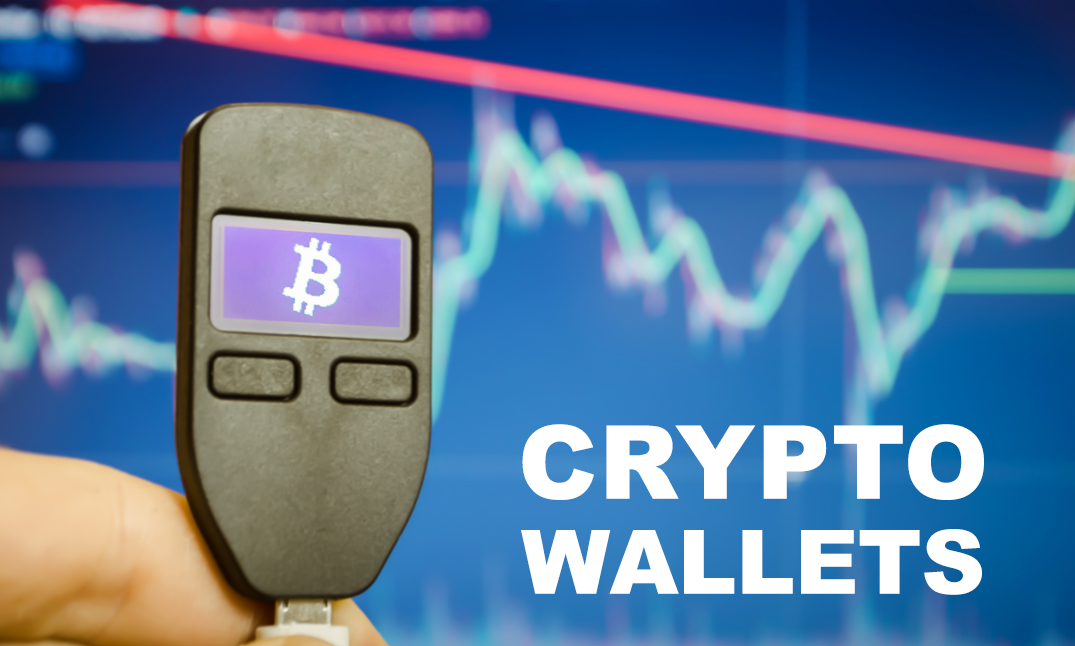What is a Crypto Wallet? Plus Best Suggestions for 2022
The interest in cryptocurrency has really skyrocketed over the past year, complete with a multitude of individuals and corporations buying and selling digital coins for the first time, as well as an entire country declaring Bitcoin to be legal tender. So, what does this all mean? It indicates that digital currencies are finally getting the attention and respect they deserve, and many people are now recognizing that they don’t want to miss out on the incredible investment and money-making opportunities that cryptocurrency presents.
However, being new to the game, a lot of these forward-thinking people are not equipped with the basic knowledge that’s needed to properly dive into this sector – and that’s where Crypto News Daily comes into play. We’re here to get you up to speed, and today, I’m starting with the foundational question, “What is a Crypto Wallet?”. In addition to this, I’ll also share my top crypto wallet picks for 2022.
Ok, now let’s jump right into it.
What is a Crypto Wallet?
A crypto wallet is either an online, desktop, or mobile software program, or off-line hardware device, and in some cases a paper medium, that securely stores the public and private keys that enable you to use and manage your cryptocurrencies, as well as allow for other transactions that require blockchain interaction.
If you’re surprised by this definition of a crypto wallet, don’t worry, you’re not alone. Many people are under the impression that a crypto wallet is a place where cryptocurrencies are actually stored, just as cash and credit cards are safely tucked away inside a physical wallet. Although a crypto wallet is commonly associated with the term “storage”, virtual coins are not actually held within the wallet.
Instead, a record of your transactions such as sending and receiving cryptocurrencies, purchasing items with digital coins, and more, are stored on a digital ledger on the blockchain, and the keys that are stored in your wallet are what allow the transactions to take place, and what assigns you ownership of your cryptocurrency.
The Basics of a Crypto Wallet – Private & Public Keys
Because private and public keys are generated from, as well as held within your crypto wallet, it would be a good idea for you to grasp the concept behind them and how they work together with a wallet. Cryptocurrency transactions rely upon the use of cryptographic key pairs, which consists of a private and public key. They’re not physical keys as we know them, but instead are made up of a long sequence of numbers and letters, and these keys originate from your wallet.
It basically works like this – when a crypto wallet is created, a private key is generated, and from this, a public key is established. An address, which some refer to as your wallet address, is then formed, which is just a shorter or hashed version of the public key. To simplify this, let’s say the wallet is like a bank account, with the public key being equivalent to an account number (wallet address) that directs people where to send the assets (cryptocurrency), and the private key is comparable to a PIN code that only allows you access to the bank account (wallet), and validates that you’re the account holder. You can give anyone access to your public key, just as anyone can possess your bank account number without having the ability to withdraw funds.
A Seed Phrase is Used as Your Private Key Recovery Phrase
Since private keys contain too many random letters and numbers to remember, most wallets typically generate what is called a seed phrase, and the private keys originate from it. This is a 12 to 24 word phrase that’s easier to remember and used to gain access to your wallet if you were to ever lose that access for any reason. Think of the seed phrase as the master password to your wallet that may contain multiple private keys.
How Crypto Wallet Transactions Work
For a cryptocurrency transaction to be executed through the blockchain, a valid signature is required, and this is where the private key is utilized. For example, if you were to initiate sending bitcoin to another person’s crypto wallet, your wallet will create a digital signature by processing the transaction with your private key. This private key is used to validate that you’re the owner of that bitcoin that’s assigned to your wallet, and the location or address of your wallet is represented by your public key. Your private key and public key are verified to ensure they match before the bitcoins can be released from your wallet. Once validated, the crypto is sent to the public key or address of the receiving wallet.
Keep in mind that bitcoins are not actually leaving your wallet and being deposited into the wallet on the receiving end, but instead, data that represents this giving and receiving is recorded on the blockchain, and it’s all validated by crypto miners on the network and added to the public ledger on the blockchain – making it a secure, transparent, and reliable transaction.
What are the Different Types of Crypto Wallets?
Now that you have a basic understanding of what a crypto wallet is and how it works, let’s dive into the different types of wallets, which can be divided into two categories – hot and cold storage, which are also referred to as software and hardware wallets. In addition to this, they can be placed into a subcategory by labeling them either custodial or non-custodial, which I’ll discuss first.
Custodial & Non-Custodial Wallets
Becoming familiar with what type of crypto wallets are available is essential, but it’s also important to understand why a wallet may be referred to as custodial or non-custodial because these labels determine who controls your wallet and private keys. With that said, let’s take a look at both:
Custodial Wallets
A custodial wallet is one in which your wallet and private keys are held and managed by a third party, and they’re responsible for securing them for you. This is a typical scenario when you’re trading through a web-based exchange like Coinbase. Many people who start trading through a platform such as this may not even know what a wallet or a private key is, and they don’t really need to because the custodian handles everything for them.
Some prefer a custodial wallet because it’s convenient and less responsibility since all the user really needs to make a transaction happen is their username and password, as opposed to keeping track of their private key. If you manage your own wallet and a private key is lost, there is a chance that you may not be able to gain access to your crypto wallet again. However, if you’re using a custodial wallet, you can simply have your password reset if you lose it.
Non-Custodial Wallets
In contrast, a non-custodial wallet puts the investor in the driver’s seat when it comes to controlling their wallet, private keys, and the security of their crypto. Although users of non-custodial wallets may have to take note of the responsibility factor of ensuring that they must never lose their private keys, the fact that they are the only one who has access to their wallet and keys can be well worth taking on that responsibility. Off-line cold wallets are well-known for being non-custodial.
Hot & Cold Storage Wallet Types
Ok, now let’s take a look at hot and cold storage wallets so you can gain a full understanding of their differences. Although both hot and cold wallets enable users to store, send, and receive crypto, the difference mainly lies in whether or not they are connected to the internet, and therefore the level of security they offer.
1. Hot Wallets
A wallet that’s categorized as hot is one that connects to the internet. This could be a wallet that’s through an exchange such as Coinbase or Binance, as well as a software wallet that can be downloaded to a desktop or mobile phone. In addition to this, some hot wallets can be custodial or non-custodial. One of the main benefits of using a hot wallet would be its ease of use. Specifically, how it makes buying and selling crypto convenient and fast. However, because a hot wallet is connected to the internet, it has the potential to be vulnerable to online attacks, so it’s important to ensure your wallet stems from a trusted, secure, and reliable source.
Common Hot Wallet Types:
- Online Exchange-Based Wallets Such as Coinbase
- Website-Based Wallets Like MyEtherWallet
- Desktop Wallets Such as Electrum
- Mobile Wallets Such as Mycelium
Securing Your Crypto While Using a Hot Wallet
It’s common for seasoned investors to only keep a portion of their cryptocurrency in a hot wallet for ease of use, while storing the bulk of their holdings in a cold wallet for security reasons. Additionally, for those who have crypto stored on an exchange, a reputable company should be storing a percentage of their overall client’s crypto assets in off-line cold wallets for security purposes so that in the event of an attack, they can’t be accessed by cybercriminals.
2. Cold Wallets
A cold wallet is characterized by the fact that it’s not connected to the internet, and the private keys are stored in an off-line environment, and it’s normally non-custodial. Cold crypto wallets typically come in the form of a USB-type device, often called hardware wallets.
The most notable benefit of a cold storage wallet is its high level of security. This is due to the fact that the private keys are never exposed to the internet because transactions are confirmed and signed “in-device”, and then the data is sent to the blockchain through the internet. Although secure, cold wallet users generally don’t enjoy the same ease of use that hot wallet users do, and there is always the risk of misplacing their cold wallet device. Cold wallets are ideal for those who have a considerable amount of Bitcoin or altcoins attached to their wallet and want to keep it secure and out of reach of cybercriminals, as well as anyone who prefers to have complete control of their private keys.
Common Cold Wallet Types:
- Hardware Wallets such as Ledger
- Paper Wallets in Which Keys or QR Codes are Simply Printed on Paper
Best Crypto Wallets for 2022
My guess is that since you’re researching what a crypto wallet is, you might also be looking for advice on which wallets are not only popular, but also reputable. With that said, it’s always helpful to get a few suggestions from someone who’s been around the block a few times, and since I’ve had my fair share of both hot and cold wallet usage, I’ll pass along my top crypto wallet picks for 2022.
Hot Crypto Wallet Suggestions
If you find hot wallets meet your need for speed and convenience, but you also want to ensure the company you go with offers great security, I recommend the following:
Exchange-Based Wallets:
Coinbase: In my experience, for exchange-based wallets, Coinbase is an excellent choice because the company is known for its focus on encryption and security, making them one of the most secure exchanges to buy, sell, and store crypto on. Coinbase is easy to use, is the 2nd largest exchange on the market, and it’s open to U.S. residents. They even offer a sister exchange for more advanced crypto traders called Coinbase Pro. Overall, Coinbase has a superior system in place that will keep your private keys safeguarded for you, all while providing an excellent platform for crypto traders, with a variety of coin choices.
Kucoin: You may also want to consider Kucoin, an exchange that gives you access to hundreds of coins that you won’t find on Coinbase. They’re smaller cap coins with a higher risk, but with that can come high rewards. It’s worth noting that if you live in the United States, you’ll have to use a VPN to trade on this exchange since U.S. residents will not be able to actively trade on the site.
Binance: I also recommend Binance, which like Kucoin, offers a multitude of various coins that are not on Coinbase. Plus, Binance is one of the largest exchanges by volume. This crypto exchange is also set up in a way that hinders U.S. residents from freely trading; you’ll need a VPN. However, they do offer Binance.us, their sister site for those that live in American, but the U.S. version of Binance offers fewer coin choices than Coinbase, which makes Coinbase the better choice if you don’t want to use a VPN.
Mobile Wallet:
Mycelium: For those who invest in Bitcoin, I suggest the Mycelium mobile-based wallet. It’s one of the most popular Bitcoin wallets with over two hundred thousand users worldwide. In addition to this, it’s feature-rich, a good fit for beginners, as well as advanced crypto investors, and Mycelium is highly secure when it comes to protecting your private keys and crypto. As far as the popular mobile wallets are concerned, Mycelium is one of the oldest, making it a trusted and reliable choice. In addition to being compatible with Bitcoin, the Mycelium wallet has expanded to include compatibility with Ethereum, and various ERC-20 tokens.
Cold Crypto Wallet Suggestions
If you’re more focused on the highest level of security to safeguard your crypto with a cold wallet, this is my personal choice:
Hardware Wallet
Ledger Nano X: The Ledger crypto hardware wallet is by far my top choice for cold storage, and I guess I’m not alone because over 3 million Ledger hardware wallets have been sold to date. As for the Ledger Nano X, it supports over 1,800 coins and tokens with the Ledger Live app, allows for the use of 100 different crypto types at once, and comes complete with a secure certified chip that’s specifically designed to withstand high-level attacks, which keeps your crypto and private keys safe. The Ledger wallet also allows you to buy, sell, and exchange crypto through its app, and has Bluetooth integration for iPhone and Android. Overall, it’s a wise choice for anyone looking to keep their crypto in a safe off-line wallet.
Choose the Best Crypto Wallet for 2022
My hope is that this deep dive into the topic of what a crypto wallet is, how it works, and my top picks for 2022, has given you enough insight to head into the new year with a digital wallet choice that works well for your investment needs – taking into consideration what type of coins a wallet is compatible with, security features, convenience, and so on. Also, be sure to do your due diligence and research the crypto wallet you’re considering so that you’ll have peace of mind when it comes to safeguarding your crypto.
A few things before I wrap this up…
If there are any real estate investors out there who also have an interest in cryptocurrency, you will love these two articles on the following topics: Tokenized Rental Real Estate, as well as Property Purchases on the Blockchain. And for those who are not 100 percent positive if they actually do need a place to store there crypto, check out our newest article on that very topic – Do I Need a Crypto Wallet?
If you’d like to explore the topic of crypto wallets even further, then you may be interested in hearing about a particular wallet that’s making waves in what we call the metaverse. You can do so by checking out our video below that covers MetaMask, which is one of the top Etherum based wallets:










